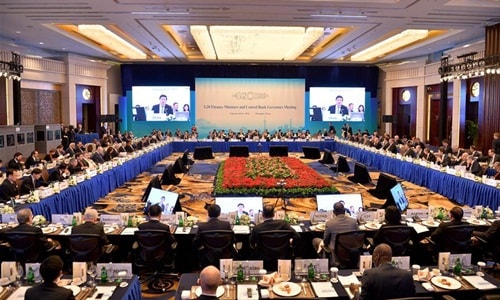G20 pledges to boost global growth
Leaders of the world's top 20 economies have vowed to use all policy tools to stimulate growth, despite Germany's dissatisfaction with fiscal and monetary easing.
In a joint statement after a two-day meeting in Shanghai (China), finance ministers and central bank governors of G20 countries affirmed that the global economy is still recovering, although "it is still uneven and has not met expectations of balanced, sustainable and strong growth."
The G20 meeting took place in the context of the host country, China, slowing growth, global financial markets plunging, and US interest rates rising for the first time in nine years, while Japan cut its interest rates to negative levels. Previously, the Organization for Economic Cooperation and Development (OECD) also lowered its global growth forecast for this year from 3.3% to 3%.
The G20 joint communique listed many risks facing the world, including fluctuations in capital outflows, falling commodity prices, rising geopolitical tensions and "the shock from the risk of Britain leaving the European Union (EU) and the increasing number of refugees arriving in some countries".
 |
The G20 countries have concluded their two-day meeting in Shanghai. Photo: News.cn |
However, countries are still divided on how to solve the problem. German Finance Minister Wolfgang Schaeuble said that efforts to stimulate the economy through monetary easing could be counterproductive. Fiscal easing (through increased public spending or tax cuts) has lost its effectiveness.
"Fiscal and monetary policies have reached their limits. If you want the economy to really grow, there is no shortcut without reform," he said.
As the EU’s largest and richest member, Germany has sometimes had economic priorities that were different from those of other countries. Mr Schaeuble disagreed with the US, the UK and China, which have advocated using fiscal and monetary tools to fight economic downturns.
The joint communique also said the G20 "will use all policy tools - fiscal, monetary, structural - individually and jointly" to build confidence and strengthen the recovery. However, they also acknowledged that increasing money supply alone will not lead to balanced growth and that fiscal policies will also be used "flexibly".
The countries also reiterated their commitment to “refrain from currency devaluations” and to “closely monitor developments in the foreign exchange market.” In response to recent concerns that China might devalue the yuan further to make its exports more competitive, Premier Li Keqiang and Chinese representatives at the G20 meeting said there was “no intention and no decision to devalue the currency.”
According to VNE
| RELATED NEWS |
|---|
